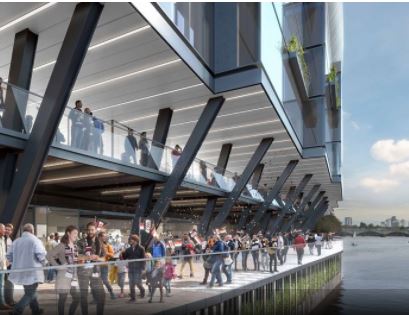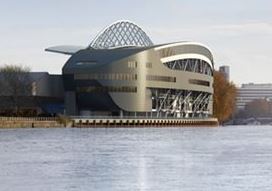Fulham FC Gets Go Ahead to Redevelop Riverside Stand
Council's planning committee grants permission for 'high quality" scheme

The club says it is "delighted" by the decision, which followed consultations with supporters and local residents last October.
The new stand will increase the overall capacity of Craven Cottage and the main works are expected to commence in the Summer of 2019, with a full timeline of scheduled works announced in due course.
The club’s previous Riverside Stand design received planning permission in 2013 and this enhanced scheme also incorporates the opening of the riverside walk from Putney to Hammersmith, an aspect of the approved design and a major benefit to the local area, in addition to improved facilities for users on both match and non-match days.
The planning officer's report, recommending that planning permission should be granted, described the scheme as "a high-quality development" which would retain the presence of a landmark football stadium in the borough and added that the extension of the river walkway meets a long-standing aspiration of the Council.
The report said that the proposal would also create a community hub through the provision
of restaurants, bars, cafes and event space for residents and visitors to the area to
enjoy, as well as the creation of jobs during both the construction and operation phases.
The application was as follows:
Demolition of the Riverside Stand and partial reconfiguration of the Putney Stand (western end) and Hammersmith Stand (western end), and removal of four floodlight masts; and the development of a new Riverside Stand providing two tiers of seating (creating an overall seating capacity of up to 29,600); a new extended section of riverside walkway; basement; leisure/retail provision for A1, A3, A4, A5, D2 use classes; 9 serviced apartments (Use Class C1); parking; a new river wall; a temporary construction river platform and construction compound; and associated landscaping (including boundary work), lighting (including new and replacement floodlighting) and ground works and all ancillary or incidental works and structures.
It can be seen in full, along with supporting documents here.
Fulham Football Club Chairman, Shahid Khan, said last night: "Our goal for a brighter future for Fulham Football Club, the neighbourhood, our borough and all of London is now at our doorstep.
"Tonight's news wouldn't be possible if not for supporters and local residents who believed in our vision, so I hope they will join us in celebrating what will be a new and important chapter in the history of Fulham and Craven Cottage. While there are too many people to thank, no one who helped to play a role in this process to date will ever be forgotten."
Fulham Football Club CEO, Alistair Mackintosh, added: " “We are all delighted with the outcome of the decision this evening. Craven Cottage has been the home of Fulham Football Club since 1896 and it’s fantastic news for our supporters, our local community and everyone associated with the Club.
Subject to fulfilling the necessary conditions, we are excited that plans to redevelop the Riverside Stand may proceed and improve facilities available throughout the year, helping to deliver our Chairman’s long-term vision of providing a world-class venue whilst safeguarding the Club’s future at Craven Cottage.
"We are grateful for the support, ideas, energy and inspiration of our Chairman, Mr Shahid Khan, in improving the design and bringing it to this point. Thank you also to the Fulham Supporters’ Trust for their assistance and all the supporters and staff who have commented on, provided ideas for, and backed the scheme in addition to the great work by everyone involved with the project."
Craven Cottage currently holds 25,700, with the current riverside stand housing the VIP seats and corporate hospitality, the camera gantry and dugouts.
The Stevenage Road stand, opposite the riverside stand was designed by Edwardian stadium specialist Archibald Leitch and listed in the 1980s to protect it from developers.
Also listed was the famous two-storey pavilion dating from 1905 at the corner of the ground built as an afterthought by Leitch when he realised he’d forgotten to include changing rooms in his original design.
March 23, 2018
